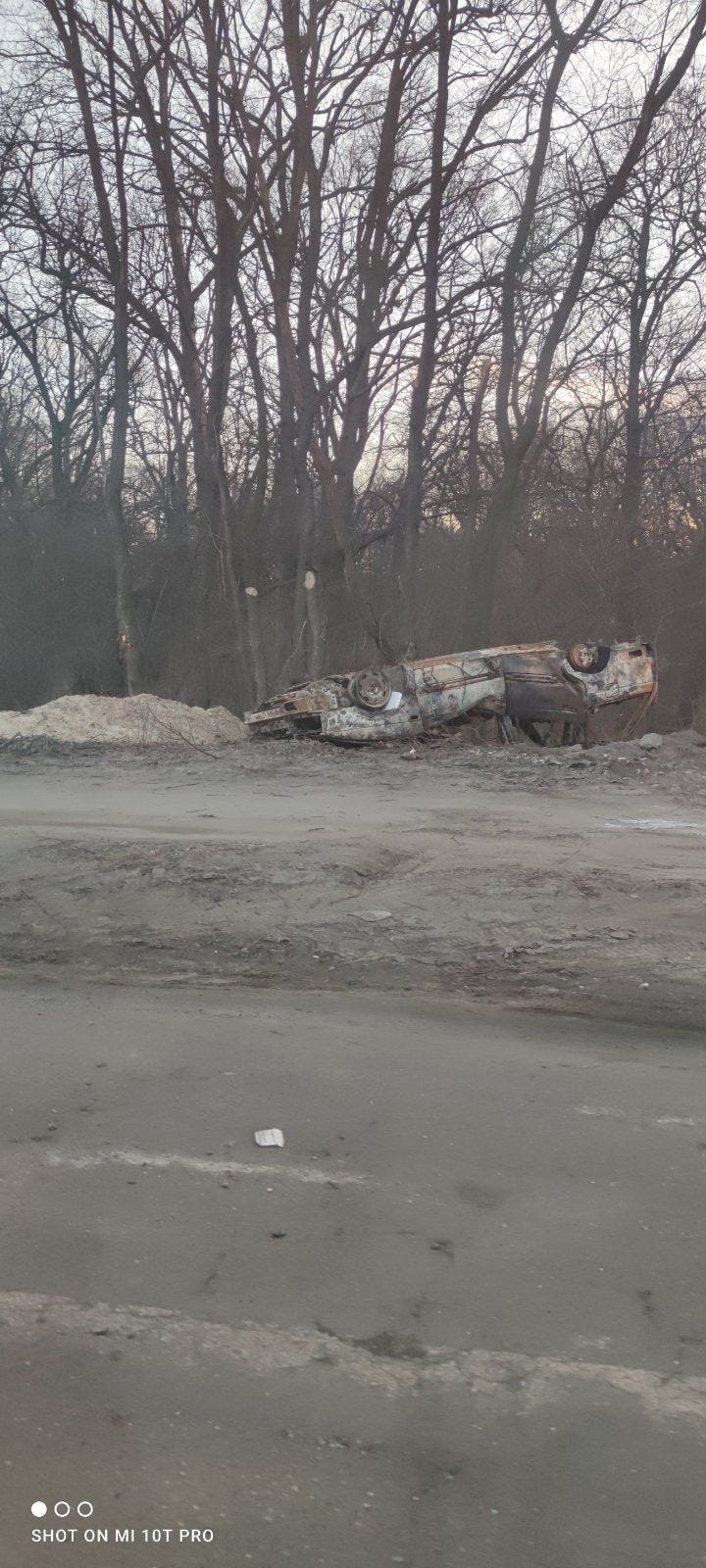ESCAPE FROM CHORNOBYL
Eyewitness Story: “What to eat? Cats and dogs were not an option.”


On March 16, my phone rang. Olesya — a friend of my friend from Slavutych — a satellite town near Chernobyl Power Plant station — called. Olesya is not her real name; a part of her family is still in Ukraine, in a town besieged by the Russian military. Disclosing identity is dangerous.
“We made it,” she said.
Olesya, with two kids, and another family, also with two more kids, decided to take a risk and leave the starving city even though the Russians were shooting at the cars on the way out. They made it on time.
Today, March 25th, Slavutich is surrounded by the Russian military, with snipers shooting at people walking their dogs. The mayor of Slavutich Yuri Fomichev, “The third day of fighting. They did not enter the city. The fighting is on the outskirts. We do not surrender the city, but the forces are not equal. We will find out in the morning how many civilians died.”
Olesya wanted me to share the real story of Slavutych.
What is the situation in Slavutych?
It’s a catastrophe. Russian planes are there all the time, they drop missiles near Chernihiv from the direction of Belarus. The last food supplies were delivered to the shops in Slavutych on February 23–24. In terms of the supply situation, Slavutich has a special status and the food needs to be delivered with a special effort. On February 26, the shops were already empty: tea, coffee, sweets, nothing else. Now, this is no longer the case. They are empty.
What do people eat?

There was no bread for 6–7 days. We didn’t even have it before, because there was no yeast or flour. Volunteers found grains, ground them, and it was wartime, front-line bread, which was sold by 230 g per person. There were thousands of people in line for this bread. My husband was in it for six hours. One loaf per person. In order to get bread ratios for the whole family, it was necessary to bring the whole family to the queue. My niece and her husband, with two children, two months and six years old, moved to our house, they were too scared to stay on their own. I have two children, eleven and sixteen years old. Four adults and four children in a family. For eight people, two men brought 230 pieces of bread each — a total of 460 g.
There was frozen food in the freezers but on March 9th we lost electricity and water. The city was not ready for this. When the light went out, supplies began to deteriorate as the freezers in the refrigerator turned off. They turned on the light on March 14, at 9–10 pm, so people saved the supply of food in the freezers but who knows for how long the light would stay on.
How did people cook food from the freezers?
In Slavutich, we have no gas, only electricity, and that was caught off. All people were going outside into the streets to cook food on fires, as the shelling roared and thundered. The local forestry supplied firewood.
Was humanitarian aid delivered in the city of Slavutych?
Humanitarian corridors are promised but they haven’t happened yet. At the moment, humanitarian aid was brought to Slavutych by volunteers. They just went at their own peril and risk, since the most basic supplies were missing. We have people with diabetes who need insulin, people with epilepsy. There is a kindergarten for children with mental retardation. Not enough diapers. We had a policeman, he was at work, his wife was at home with two children, two with cerebral palsy, and there was no way to change them when there was no water and electricity until the generator worked.
What is the state of mind, what are the moods of people in Slavtich? Do people accept compromise?
They don’t even consider it. They want Ukraine to win. They don’t even consider other options. Previously, a compromise would have been possible, but now I hear curses, and “we will never forgive.” Many stopped talking to their relatives in Russia, they say “we don’t have relatives there.” People are exhausted. Nobody wants any compromises. Putin came to our land. And he says that we are firing at ourselves. That there is no war. That he is a savior. Whom is he saving? And, he thinks, why these people did not come out to meet with flowers? There are a couple of people — Russophiles, they say, “Well, we will live under the Russians. We will have not hryvnia, but rubles. What difference does it make to you who you live with.” And I say — there is a difference for me. I’m leaving here forever.
We even have many people who completely switched to Ukrainian, and they used to speak Russian all their lives. We don’t want to speak the language spoken by the people who kill our children, our youth, our old people. We have grandfathers who should be enjoying their retirement, and they are part of the territorial defense. Why is this? What for?
How did you manage to get out?
I left Slavutich at my own risk. Several cars came with us. I didn’t persuade anyone. This was a risk. Many are shot. Near Kyiv, in a traffic jam, they shot a car from Chernihiv. But I decided to do it because I didn’t want to explain to my child what we were going to eat later. There are no cattle nearby. Cats and dogs were not an option.
What did you see along the way?


Today I drove through Kyiv, saw burnt, shelled houses. The road to the western border, which takes 10 hours, took two days. We arrived in the Kyiv region, our car plastered with posters: Children, Children, Children. And a man in military uniform and with a machine gun at the checkpoint stopped us. He checked the documents, examined the trunk, and asked, “Are you hungry? Can we feed you?” We’re leaving and I’m crying. [The war] connected people so much. Everyone worries about each other. We may not be on the phone, but we’re texting, “How are you? Are you alive?” or roll call, who’s where.
Do people still leave Slavutich?
Now it’s impossible to leave. Roads are closed. People of Slavutych are hostages. No exit. They no longer make green corridors. It’s like Leningrad under the Siege.
What happened at the Chornobyl nuclear power plant?
The Chornobyl nuclear power plant was captured by the Russian Army. The nuclear plant personnel that started their shift on February 23, 2022, the day before the Russian invasion of Ukraine, are still working today.
Did you have contact with people at the Chernobyl nuclear power plant?
I did. They cannot speak freely as they are under supervision, by armed guards. They call the central office where their wives and mothers line up [to talk to them].
What were the working conditions?
The team does their job because it is so important. If an accident occurs, it will be a worldwide catastrophe. It is not only our city or region that will suffer. Imagine, you are a human being and you work twenty-one-day in a row, for twelve hours, you sleep sitting on a chair and eat once or twice a day.
When the girls I knew last called from the cafeteria, [they said] the supplies arrived twenty-one days before, and there were no more food deliveries. They stretch out the food supplies to feed these employees.
What is the situation with humanitarian aid at nuclear power plants?
The Russians brought humanitarian aid, but Ukrainian employees refused to take it. To make a propaganda video, Russian soldiers broke into the lockers of our employees, put on the uniform of the NAVARKA company, and, pretending to be Ukrainians, staged the scene of employees accepting the aide. And NAVARKA is a French company, it has not been working there for a long time. Not a single person from the Ukrainian employees came out to take their humanitarian aid.
Do you know anyone from this team?
Yes. A friend works there now. He has a wife with a small child in Slavutych. The area around is being bombed. You can imagine, he is not in the best mental state. He understands that his family is suffering in Slavutych. The men that are with their families can stand in line, they can help. In my family, my husband was in line for bread and I was in line for milk. But my friend has been there for the twenty-first day. When there is an air raid in the city — imagine how he feels.
And what could be the consequences of failures?
Our engineers say that nuclear reactors are filled with waste. The temperature must be maintained because if the reactors start to overheat, it will be a second Chornobyl.
*****
Read more stories of Ukrainian people:
